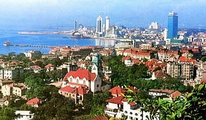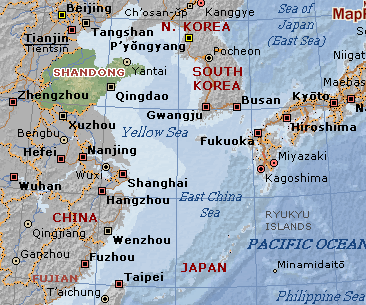Venue

Shandong Province is a significant coastal province in East China. Located on the lower reaches of the Yellow River, it borders the Bohai Sea and Yellow Sea in the east, and faces the Korean Peninsula and the Japanese Archipelago to the east.
 Shandong is one of the birthplaces of the ancient Chinese culture.
Shandong has always been known as the "hometown of Confucius and Mencius,
as well as the land of ceremony and propriety". Throughout history,
Shandong has produced many celebrities who have exerted great influence
on Chinese culture, and that continues to this day. Confucianism created
by Confucius, the great thinker, educator and politician honored as a
sage, is pivotal to Chinese culture and still exerts influence around
the world. The Art of War written by Sun-tzu, a famous ancient
strategist in Shandong , is considered as a classic in both military and
commercial circles. Besides Confucius and Sun-tzu, who were respectively
renowned as the "Sage of Culture" and the "Sage of Strategy", other
famous ancient figures from Shandong include Wang Xizhi, the "Sage of
Calligraphy",
Shandong is one of the birthplaces of the ancient Chinese culture.
Shandong has always been known as the "hometown of Confucius and Mencius,
as well as the land of ceremony and propriety". Throughout history,
Shandong has produced many celebrities who have exerted great influence
on Chinese culture, and that continues to this day. Confucianism created
by Confucius, the great thinker, educator and politician honored as a
sage, is pivotal to Chinese culture and still exerts influence around
the world. The Art of War written by Sun-tzu, a famous ancient
strategist in Shandong , is considered as a classic in both military and
commercial circles. Besides Confucius and Sun-tzu, who were respectively
renowned as the "Sage of Culture" and the "Sage of Strategy", other
famous ancient figures from Shandong include Wang Xizhi, the "Sage of
Calligraphy",
Shandong is also blessed with beautiful landscapes. The most famous scenic spots are Mount Taishan , Mt. Laoshan and the seaside of the Jiaodong peninsula. Mount Taishan , the Temple and Cemetery of Confucius and the Confucius Mansion in Qufu are inscribed on the World Cultural and Natural Heritage List by UNESCO.
 Qingdao is located at the mouth of a natural inlet on the
south coast of the Shandong Peninsula . Qingdao is one of China 's most
important economic cities and is the nation's fourth largest port.
Qingdao is located at the mouth of a natural inlet on the
south coast of the Shandong Peninsula . Qingdao is one of China 's most
important economic cities and is the nation's fourth largest port.
A German concession taken in 1897 and ceded for a total of 99 years, the city retains much of its colonial architecture and charm. The city has changed hands many times since then (the Japanese took the port in 1914, formerly ceded to them by the Treaty of Versailles in 1921, it returned to China in 1922, was then taken back by the Japanese in 1938 and finally returned to its present owners during World War II, 1945), but the dislocations of these changes have left little mark upon the city proper.
Qingdao lies between mountain and sea, a well chosen coastal port with clear deep waters and a comfortable climate. The mountains provide a collection of interesting sights, centered around the mystical Laoshan, while the sea provides relaxation, gentle waves, bared rocks, and some golden beaches forming what is probably China 's best northern beach resort. The historical culture, variety of religion, civil traditions, village customs, and holiday celebrations all add to Qingdao 's rich culture.
The German influence in Qingdao extends beyond impressive architecture to many other areas; from town planning, creating lush wooded avenues and some of China's best parks, to local customs. Of particular interest to many of her visitors is, of course, the Tsingdao beer, produced locally from the pure Laoshan water, and whose origins lie in the first brewery, established in 1903. For those so inclined, the Beer festival (August 12-26) is a great time to visit.
 Qingdao , which has retained much of its Teutonic architecture,
remains one of China 's more charming and relaxing cities. With its
year-round mild climate, Qingdao also hosts many fairs and festivals
throughout the year, Of particular interest to many of her visitors is,
of course, the Tsingdao beer, produced locally from the pure Laoshan
water, and whose origins lie in the first brewery, established in 1903.
For those so inclined, the Beer festival (August 12-26) is a great time
to visit. Summers see the town packed with Chinese visitors, making
spring and fall better times to visit if you hope to avoid the crowds.
Qingdao is the co-host city of the Olympic Sailing Regatta for the
Beijing 2008 Olympic Games.
Qingdao , which has retained much of its Teutonic architecture,
remains one of China 's more charming and relaxing cities. With its
year-round mild climate, Qingdao also hosts many fairs and festivals
throughout the year, Of particular interest to many of her visitors is,
of course, the Tsingdao beer, produced locally from the pure Laoshan
water, and whose origins lie in the first brewery, established in 1903.
For those so inclined, the Beer festival (August 12-26) is a great time
to visit. Summers see the town packed with Chinese visitors, making
spring and fall better times to visit if you hope to avoid the crowds.
Qingdao is the co-host city of the Olympic Sailing Regatta for the
Beijing 2008 Olympic Games.

Transportation
As an important harbour and industrial base in Shandong Province , Qingdao is well connected to other cities in China and destinations around the world.
Airport
From almost all the major cities in China , Qingdao is easily accessable by air. The city is also connected with some international destinations, mostly in Japan and Korea . The Qingdao Airport is located 33km north of the city proper and there are buses available from the airport, transfering visitors to the city within 30 minutes. Most large hotels have airline ticket offices, as well as transport to and from the airport.
Railway station
The city has a railway connection via the Jiaoji Railway. From here, trains run daily directly to Beijing , Shanghai , Guangzhou , Wuhan , Zhengzhou , Taiyuan and many more. To destinations within the province, such as Tai'an, Ji'nan and Yantai, there is at least one train available per day. The train station is located just to the east of the bottom of Zhongshan Lu, just up from the Number Six Beach .
Bus station
Thanks to the sophisticated express- way in Shandong Province , it is extremely convenient to travel to and from Qingdao by bus. From Ji'nan, Tai'an, Yantai, Weihai and many cities in other provinces, there are regular buses available. Buses depart from the Long Distance Bus Station (Changtu qichezhan) near the railway station.